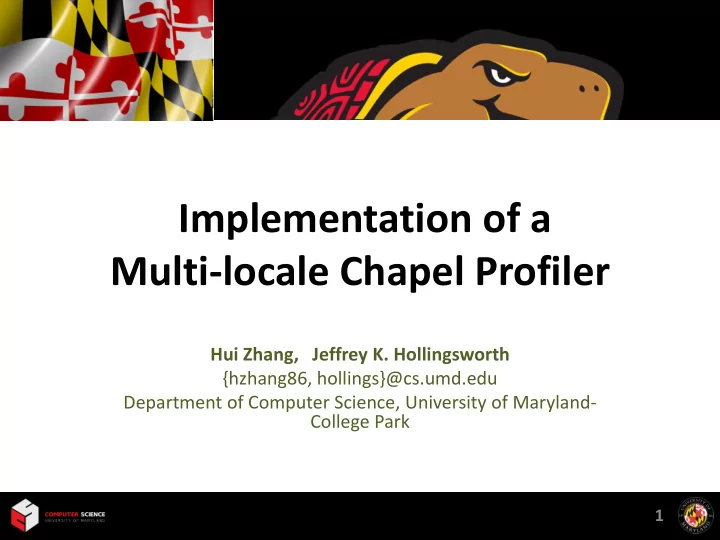

Implementation of a Multi-locale Chapel Profiler Hui Zhang, Jeffrey K. Hollingsworth {hzhang86, hollings}@cs.umd.edu Department of Computer Science, University of Maryland- College Park 1
Motivation Chapel is an emerging PGAS language with productive parallel programming features Potential for performance improvement (especially in multi-locale) and few Chapel- specific profilers for its end users Insights for the language evolvement in the future and same idea can be applied to other parallel programming paradigms 2
Data-centric Profiling Code-centric Profiling int busy(int *x) { // hotspot function main: 100% main: 100% *x = complex(); busy: 100% busy: 100% return *x; complex: 100% complex: 100% } int main() { Data-centric Profiling for (i=0; i<n; i++) { A[i] = busy(&B[i]) + busy(&C[i-1]) + A: 100% A: 100% busy(&C[i+1]); B: 33.3% B: 33.3% } C: 66.7% C: 66.7% } 3
Multi-locale Challenges • 1 st Challenge: Aggregate blame of many temporary variables that point/refer to the distributed variables through remote data accesses. • Solution : L ink variable PvID (privatized id) with different objects accessed through specifc Chapel runtime functions: chpl_getPrivatizedCopy, and chpl_getPrivatizedClass. 4
Multi-locale Challenges • 2 nd Challenge: Recover the hidden and interrupted data-flow information from Chapel runtime and internal module function calls (chpl_gen_comm_get, chpl_ taskListAddBegin, etc. ) • Solution : Conduct simplified blame analysis for Chapel standard modules; resolve actual wrapper task function statically through function pointers 5
Multi-locale Challenges • 3 rd Challenge: Reconstruct the full calling context for each sample and handle asynchronous&remote tasking features • Solution : Instrument Chapel tasking and communication layer; log “ fID, sID and rID ” for each remote task; iteratively glue stacktraces before the current calling context until “main” 6
New Tool Functionality Load Imbalance Check Node information for Ab of HPL on 32 locales 7
Experiment – ISx Data-centric 2-loc 8-loc myBucketedKeys 41.1% 22.9% myKeys 36.9% 20.9% sendOffsets 27.3% 15.4% Name original localization bucketOffsets 26.9% 15.2% barrier 10.3% 20.8% myBucketedKeys 41.11% 17.78% Code-centric 2-loc 8-loc sendOffsets 27.28% 6.02% bucketSort 80.9% 64.2% bucketOffsets 26.85% 5.46% bucketizeLocalKeys 40.2% 22.3% countLocalKeys 11.4% 6.4% bucketizeLocalKeys 40.24% 24.54% pthread_spin_lock 16.7% 29.3% chpl_comm_barrier 0 3.46% 1. Optimize “Barrier” module 2. Apply “local” clause 8
Experiment - LULESH Variable Type Blame Context Elems Struct 74.3% chpl_gen_main elemToNode Struct 60.4% chpl_gen_main xd/yd/zd Struct 48.0% chpl_gen_main x/y/z Struct 37.0% chpl_gen_main fx/fy/fz Struct 35.6% chpl_gen_main dvdx/dvdy/dvdz Struct 33.4% CalcHourglassControlForElems x8n/y8n/z8n Struct 33.3% CalcHourglassControlForElems elemMass Struct 29.5% chpl_gen_main hgfx/hgfy/hgfz Array 26.7% CalcFBHourglassForceForElems shx/shy/shz Double 26.7% CalcElemFBHourglassForce hx/hy/hz Array 26.6% CalcElemFBHourglassForce dxx/dyy/dzz Struct 12.2% CalcLagrangeElements 9
LULESH Optimization: Globalization Problem : Variable Blame Context proc CalcHourglassControlForElems (determ) { Elems 74.3% chpl_gen_main var dvdx, dvdy, dydz, x8n, y8n, z8n: [Elems] 8*real; elemToNode 60.4% chpl_gen_main … xd/yd/zd 48.0% chpl_gen_main Solution: x/y/z 37.0% chpl_gen_main Hoisting distributed local variables to the global fx/fy/fz 35.6% chpl_gen_main space so that they won’t be dynamically dvdx/dvdy/dvdz 33.4% CalcHourglassControlForElems allocated frequently. x8n/y8n/z8n 33.3% CalcHourglassControlForElems Result: elemMass 29.5% chpl_gen_main 30.00 Execution Time (s) 25.00 hgfx/hgfy/hgfz 26.7% CalcFBHourglassForceForElems 20.00 shx/shy/shz 26.7% CalcElemFBHourglassForce Original 15.00 10.00 Globalization hx/hy/hz 26.6% CalcElemFBHourglassForce 5.00 0.00 dxx/dyy/dzz 12.2% CalcLagrangeElements 2 4 8 16 32 #nodes 10
LULESH Optimization: Replication Problem : Variable Blame Context Frequent calls to “ localizeNeighborNodes ” on Elems 74.3% chpl_gen_main these variables which incurs sequential remote elemToNode 60.4% chpl_gen_main data accesses. xd/yd/zd 48.0% chpl_gen_main for i in 1..nodesPerElem x/y/z 37.0% chpl_gen_main { const noi = fx/fy/fz 35.6% chpl_gen_main elemToNode[eli][i]; dvdx/dvdy/dvdz 33.4% CalcHourglassControlForElems x_local[i] = x[noi]; y_local[i] = y[noi]; x8n/y8n/z8n 33.3% CalcHourglassControlForElems z_local[i] = z[noi]; } elemMass 29.5% chpl_gen_main Solution: hgfx/hgfy/hgfz 26.7% CalcFBHourglassForceForElems Allocate global maps to prestore neighboring shx/shy/shz 26.7% CalcElemFBHourglassForce nodes for each element using the same hx/hy/hz 26.6% CalcElemFBHourglassForce domain: var x_map: [Elems] nodesPerElem*real dxx/dyy/dzz 12.2% CalcLagrangeElements 11
Conclusion LULESH 30.00 move from having move from having 25.00 slowdown as more locales slowdown as more locales Original Time (sec) 20.00 4x were added to having were added to having 15.00 Globalization 10.00 speedups! speedups! 5.00 Globalization+Replication 0.00 # nodes 2 4 8 16 32 Data-centric Profiling and Blame Analysis Multi-locale Support and New Features Benchmark Profiling and Optimization Full paper will be published at ICS’18 (“ChplBlamer : A Data-centric and Code-centric Combined Profiler for Multi-locale Chapel Programs”) 12
Recommend
More recommend